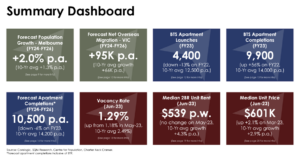Residential Build to Sell (BTS) and Build to Rent (BTR) Apartments METRO MELBOURNE H1 2023
EXECUTIVE SUMMARY Metro Melbourne H1 2023
Welcome to the latest research on the Melbourne Build to Sell (BTS) and Build to Rent (BTR) apartment markets for H1-2023. There remains a significant amount of weak sentiment and apprehension at present surrounding the apartment markets in Melbourne. In fact, sentiment in parts of the market has weakened since the release of our last report in February 2023. This is not considered reflective of the entire market, nor does it reflect everything we are now seeing and hearing on the ground, nor what is now emerging in the statistics with green shoots starting to emerge in various sub-markets. Based on discussions with many of our readers, it is acknowledged that conditions in parts of the Melbourne BTS apartment market are arguably some of the toughest they have ever been. The market has moved incredibly quickly over the last 12-18 months in light of the volatility and “push and pull” of rapid interest rate rises, the strong return of overseas migration, substantial increase in construction costs and volatile consumer sentiment.
These factors are leading to many BTS apartment projects being unfeasible, very slow pre-sale rates and projects being abandoned. Limited new apartment supply, less confidence by purchasers and increased NOM has contributed to significant rental price growth. This is also having mixed impacts on the feasibility of many BTR projects. The industry is commended for the resilience shown over the last 18 months and is encouraged to continue to both innovate and endure in these difficult times. We anticipate the BTS apartment market will continue improving over the balance of 2023 and into 2024. The BTR market will continue to emerge over 2024 and will start to mature over the next decade. The aim of this report is to provide a balanced view of the Melbourne BTS and BTR apartment markets. The key themes that have arisen during this research are summarised below and highlighted throughout this report. They will also be explored in more detail in our upcoming presentations.
The next market cycle in Melbourne has commenced
The statistics in this report support the view that the next market cycle in Melbourne has commenced. House prices have started to increase and we believe that the RBA is close to the top of the rate tightening cycle. As we highlighted in February, once there is greater market certainty that we’ve reached the top of the rate tightening cycle (which may have already occurred), overall market sentiment is expected to start improving. Once interest rates enter a cutting phase (which could be in early 2024), improved sentiment and ongoing supply issues are anticipated to combine and manifest in an extremely elastic response across the market. This is assuming that economic conditions do not notably deteriorate nor is there a significant increase in unemployment. The BTS and BTR apartment markets stand to be the primary beneficiaries of the next cycle given substantial affordability issues in Melbourne as well as the structural changes in living preferences of which our readers are now well aware.
Supply vs Demand Imbalance is even more pronounced
The supply vs demand imbalance that was highlighted in our February 2023 report in Melbourne has become even more pronounced. This report shows that the supply of BTS and BTR apartments remains at decade lows, whilst demand for new housing remains at decade highs. Melbourne needs to build between 15,000 to 18,000 BTS and BTR apartments every year to accommodate the growing population. We also maintain our view that the Government is substantially underestimating population growth. This misalignment between supply and demand is anticipated to remain an ongoing issue, and depending on the responses by Government, could potentially be exacerbated over the balance of the decade. Charter Keck Cramer is eagerly awaiting what is anticipated to be some major planning system announcements this month through the State Government’s Housing Statement. We are however very relieved that rental caps appear to no longer be considered by the Government as this would have deterred local and foreign investment and stifled supply further.

Recalibration Pains
The analysis in this report, combined with discussions with many of our readers, suggests that the Melbourne BTS apartment market is in the process of recalibrating and “jumping” ahead by a full cycle. Many stakeholders in the industry are suffering from what we are calling “recalibration pains”. The majority of buyers as well as many developers, sales agents, builders and financiers are still operating on prepandemic assumptions when it comes to land and build costs as well as apartment revenues.
The landscape in 2023 is however vastly different. We do not anticipate land values to fall materially and subject to the planning announcements this month may in fact increase in certain locations. Given the cancellation of the Commonwealth Games and likely postponement of the Airport Rail Link, we also expect building costs to stablise faster than some of the other States, albeit still increase. Quite simply then, prices of new apartments will need to recalibrate upwards for projects to become financially viable. However, opportunities to increase pricing will only present if driven by market acceptance. Further opportunities may also be available to increase prices if developers make a concerted effort to adapt to evolving purchaser expectations and offer highly desirable product.
From a market perspective, lack of new supply will invariably result in greater demand for apartment stock, being the most affordable dwelling typology. This will place upward pressure on pricing, particularly when market sentiment improves and interest rates enter a cutting phase. In recent months we have already seen increased median apartment prices in certain sub-markets due in part to the RBA holding cash rates firm and exorbitant growth in rental pricing. This has seen an increase in buyer activity as more purchasers return to the market. For developers to ensure the best opportunity to increase pricing, new projects will need to feature highly marketable characteristics in order to generate strong demand. There has also been growing interest from purchasers to acquire product within well thought out masterplanned projects, offering excellent amenity and practical design options. This is particularly in light of more residents employing a hybrid working model. Such projects in centralised locations offering superior lifestyle factors (close to public transport, retail, schools, places of employment) have been seen to notably increase project appeal.
Outlook
We want to emphasise to our readers that quite simply, people need a place to live and rapid population growth is driving demand for dwellings. Our February 2023 report highlighted the structural changes in living preferences that are occurring across Melbourne. These structural changes include the take up of apartment living, greater acceptance of renting and renting for longer. Our view is that both the “For Sale” and “For Rent” markets in Melbourne are continuing to recalibrate. The residential market is anticipated to continue to be volatile and remain distorted over 2023 and into 2024 until a new equilibrium is found. We remind our readers that Melbourne is not experiencing normal housing market conditions. This means that there will continue to be extraordinary price and rent changes with more unique levels of risk and opportunity compared to historical patterns. This requires an adjustment of risk appetite as well as well researched capital allocation.
In summary, it is very reasonable for industry to expect that over the next two years, weekly rents will continue to increase at above average levels of growth and prices of new BTS apartments will recalibrate upwards across most markets. Once the market finds a new equilibrium we anticipate that both rent and price changes will revert to longer-term trends. Finally, we remind our readers that there are certainly opportunities for those developers that are able to proceed with construction at present. It is very clear that the buyer and renter markets are seeking new stock but also certainty with respect to both costs and timing. These developers will be delivering completed stock into a market with a shortage of new BTS and BTR apartment supply over the next 2 years and will have the opportunity to be rewarded when providing desirable stock.

SOLUTIONS FOR GOVERNMENT
Melbourne has a housing crisis that has been two decades in the making. This housing crisis will not be resolved quickly, and important decisions need to be made in 2023. We have such substantial concerns that we have dedicated this section to continue to assist all levels of Government with addressing the housing crisis.
Long term bold decisions
All levels of Government in Melbourne are encouraged to be proactive, bold and take an approach that stands to resolve the housing crisis by focusing on facilitating the supply of new dwellings. The BTS and BTR apartment markets need to be stimulated as soon as possible so that supply can start to be mobilised and brought to market. The additional supply will assist in alleviating price pressures whilst resolving part of the housing crisis over the longer term. Initiatives that have already been made clear to Government by both Charter Keck Cramer and the industry include facilitating supply through removing taxes and charges, fast tracking and streamlining planning processes, and allowing foreign and local investors back into the new housing market through various incentives. This will take time, but this is the proper solution to fix this issue.
We have also undertaken research into overseas markets to further assist the Government in addressing the housing crisis in the short-term. Two key initiatives that the Government ought to consider are briefly summarised below. These initiatives will provide security of tenure to renters, deliver additional housing, provide confidence to the industry as well as further tax revenue for the Government.
Rental Assistance
Weekly rents in Melbourne are anticipated to continue to rise by exorbitant amounts over the next 18 months given the acute shortage of rental accommodation. Government ought to consider providing rental assistance to renters similar to the Section 8 Voucher Scheme in the USA. This scheme covers a portion of the rent of an eligible household and allows them to rent in a development (including a BTR or BTS development) whilst paying market rents to the landlord. A similar scheme could be adopted (or tax breaks provided) to eligible households who experience large rental increases and rental stress.
The support of renters to pay increasing market rents will assist with their security of tenure and aid in the cost of living. It will also entice investors back into the BTS apartment market and potentially enhance viability of BTR schemes as these investors will be able to achieve their investment returns. This will add to dwelling supply, provide additional tax revenue to Government and assist the housing market to recalibrate faster.
Apartment Viability Fund
At present, the current development cost of building apartments is close to or in excess ofthe on-completion market sale price in many schemes. State and Federal Governments ought to consider establishing an Apartment Viability Fund similar tothe CroiConaithe (Cities) Scheme in Ireland. The Irish scheme aims to kickstart construction of many approved apartment schemes that are currently not financially viable through providing gap funding for eligible developments in certain locations.
For the purposes of illustration, if a $10B Apartment Viability Fund was established, and gap funding of $50,000 per new apartment sold to an owner-occupier made available, around 200,000 BTS apartments could potentially be financially viable. We note that in Melbourne there are around 47,000 BTS apartments in approved schemes which could be activated through viability gap funding. This will also add to dwelling supply, provide additional tax revenue and assist the housing market to recalibrate faster. Charter Keck Cramer is available to independently advise the Government in more detail about the ideas above and we would welcome the discussion.

Source: Charter Keck Cramer










